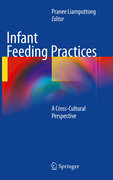
It’s natural… It’s unsightly... It’s normal... It’s dangerous. To breastfeed or not? For millions of women around the world, this personal decision is influenced by numerous social, cultural, and health factors. Infant Feeding Practices is the first book to delve into these factors from a global perspective, revealing striking similarities and differences from country to country. Dispatches from Asia, Australia, Africa, the U.K., and the U.S. explore as wide a gamut of salient issues affecting feeding practices as traditional beliefs aboutcolostrums, “breast is best” campaigns, partner attitudes, workplace culture,direct government intervention, and the pressure to be a “good mother.” Throughout these informative pages, women are seen balancing innovation and tradition to nurture healthy, thriving babies. A sampling of topics covered: Policy versus practice in infant feeding. Infant feeding in the age of AIDS. Managing the lactating body: the view from the U.S. Motherhood, work, and feeding. The effects of migration on infant feeding. From breastfeeding tradition to optimal breastfeeding practice. Infant Feeding Practices is a first-of-its-kind resource for researchers and practioners in maternal and child health, public health, global health, and cultural anthropology seeking empirical findings and culturally diverse information on this sensitive issue. Brings together current research on infant feeding beliefs and practices around the world Uniquely written from a cross-cultural perspective Makes recommendations for the provisionof health and social services to mothers and families INDICE: Infant feeding beliefs and practices across cultures: An introduction.- Part I: Social Construction of Infant Feeding & Policy Framework.- Shifting identities: Social and cultural factors that shape decision making around sustaining breastfeeding.- Managing the lactating body: The breast-feeding project at the age of anxiety.- Infant feeding as a social problem: A study of developments in Great Britain.- The imperative to breastfeed: A socio-cultural perspective.- Socio-cultural dynamics and infant feeding practices in northern Ghana: Implications for health policy in Ghana.- Part II: Women, Work andInfant Feeding Practices.- Measuring the maternal: Managing the work of breastfeeding and employment.- Good mother, infant feeding and social change in northern Thailand.- Breastfeeding practice among employed Thai women: A cultural perspective.- Part III: Infant Feeding Practices and HIV/AIDS.- Infant feedingin the era of HIV: Challenges and opportunities.- HIV/AIDS transmission through breastmilk in sub-Saharan Africa: The past, the present and the future.- From traditional breastfeeding practices to optimal breastfeeding practices, thecases of the Gambia and Malawi.- Part IV: Infant Feeding Beliefs and Practices Within Socio-Cultural Context.- Fluid boundaries: Multiple meanings of the illness ‘Moto’ in northern Malawi.- Perceptions of Maori women and their whanau(family) towards barriers in achieving best outcomes in infant breastfeeding.- Breastfeeding among Indigenous mothers in Australia.- Infant feeding beliefsand practices across cultures: Focusing on Turkey as a case in point.- Early initiation of breastfeeding and its beneficial effects in Japan.- Socio-cultural determinants of infant’s feeding patterns within six months postpartum in rural Vietnam.- Infant feeding practices following migration: initial attitudesand practices of women born in Turkey and Vietnam following migration to Australia compared with women born in Australia.- Attitudes to breastfeeding: Perspectives from mothers, fathers and society.
- ISBN: 978-1-4419-6872-2
- Editorial: Springer
- Encuadernacion: Cartoné
- Páginas: 350
- Fecha Publicación: 29/10/2010
- Nº Volúmenes: 1
- Idioma: Inglés
